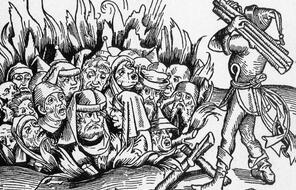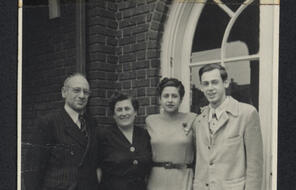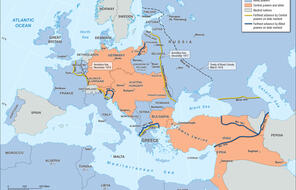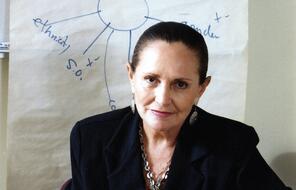Who Is Human?
At a Glance
Language
English — USSubject
- Civics & Citizenship
- Social Studies
- Human & Civil Rights
- The Holocaust
In the mid-1700s, many European philosophers and scientists began to use the ideas and methods of science to examine humans and human societies. These thinkers were part of a movement known as the Enlightenment. Most Enlightenment scientists believed that all humans everywhere have the ability to reason for themselves and form their own societies. They also believed that all humans are entitled to certain basic rights that they called natural rights. In time, these ideas spread and shaped the way ordinary people viewed the world. Some began to say that if societies are human inventions, rather than ordained by God, then people have the right to alter or even replace an oppressive government with one more to their liking.
In 1776, this theory was made concrete: 13 British colonies along the eastern coast of North America broke their ties to Britain and formed their own government. Thomas Jefferson of Virginia wrote their Declaration of Independence. It states:
We hold these truths to be self-evident: That all men are created equal; that they are endowed by their Creator with certain inalienable rights; that among these are life, liberty, and the pursuit of happiness. That, to secure these rights, governments are instituted among men, deriving their just powers from the consent of the governed; that, whenever any form of government becomes destructive of these ends, it is the right of the people to alter or abolish it, and to institute a new government, laying its foundation on such principles, and organizing its powers in such form, as to them shall seem most likely to effect their safety and happiness.
The French Revolution was also inspired by the ideas of the Enlightenment. In 1789, in their Declaration of the Rights of Man and of the Citizen, the French revolutionaries boldly stated that “Men are born, and always continue, free and equal in respect of their rights.” As a French leader explained, “Since men are all made of the same clay, there should be no distinction or superiority among them.”
But the emphasis on human equality presented Enlightenment leaders with a dilemma. Historian Ira Berlin explains:
After the Declaration of the Rights of Man [and] the Declaration of Independence, the presumption is that all men are created equal. Equality is the point. And what then has to be explained for the very first time in world history is inequality, and why inequality exists. In other words, if all men are created equal, why are some men and women still slaves? 1
Although the great thinkers of the Enlightenment stressed the equality of humankind, the belief that humanity is divided into separate and unequal races continued to develop during those same years. Less than ten years after writing the Declaration of Independence, Jefferson, a slaveholder himself, wrote:
I advance it . . . as a suspicion only, that the blacks, whether originally a distinct race, or made distinct by time and circumstances, are inferior to the whites in the endowments both of body and mind . . . This unfortunate difference of colour, and perhaps of faculty, is a powerful obstacle to the emancipation of these people. 2
Jefferson was one of many who wrestled with the contradiction in simultaneously promoting equality and upholding hierarchical divisions in society. Historian Londa Schiebinger offers one explanation:
The expansive mood of the Enlightenment—the feeling that all men are by nature equal—gave middle- and lower-class men, women, Jews, Africans, and West Indians living in Europe reason to believe that they, too, might begin to share the privileges heretofore reserved for elite European men. Optimism rested in part on the ambiguities inherent in the word “man” as used in revolutionary documents of the period. The 1789 [French] Declaration of the Rights of Man and Citizen said nothing about race or sex, leading many to assume that the liberties it proclaimed would hold universally. The future president of the French National Assembly, Honoré-Gabriel Riqueti, comte de Mirabeau, declared that no one could claim that “white men are born and remain free, black men are born and remain slaves.” Nor did the universal and celebrated “man” seem to exclude women. Addressing the Convention in 1793, an anonymous woman declared: “Citizen legislators, you have given men a constitution . . . as the constitution is based on the rights of man, we now demand the full exercise of those rights for ourselves.”
Within this revolutionary republican framework, an appeal to natural rights could be countered only by proof of natural inequalities. The marquis de Condorcet wrote, for instance, that if women were to be excluded . . . one must demonstrate a “natural difference” between men and women to legitimate that exclusion. In other words, if social inequalities were to be justified within the framework of Enlightenment thought, scientific evidence would have to show that human nature is not uniform, but differs according to age, race, and sex.
According to Schiebinger, scientists responded to this challenge by seeking “natural foundations to justify social inequalities between the sexes and races.” 3
Connection Questions
- Why did the practice of slavery call into question the ideas of Enlightenment thinkers who supported the American and French Revolutions? How did these thinkers seek to resolve the contradiction?
- According to Londa Schiebinger, the thinkers of the Enlightenment encouraged a search for “evidence . . . that human nature is not uniform, but differs according to age, race, and sex.” What does she suggest inspired that search? What consequences might such a search have?
- Suppose the Enlightenment had sought evidence of the similarities among humankind. What might have been the consequences for society of that search? For individuals within that society?
- 1Ira Berlin, interview, Race: The Power of an Illusion (California Newsreel, 2003), accessed March 21, 2016.
- 2Thomas Jefferson, “Notes on the State of Virginia” (1787), available at the Avalon Project website (Yale Law School), accessed February 10, 2016.
- 3Londa Schiebinger, Nature’s Body: Gender in the Making of Science (Boston: Beacon Press, 1993), 143–145.
How to Cite This Reading
Facing History & Ourselves, "Who Is Human?," last updated August 2, 2016.













